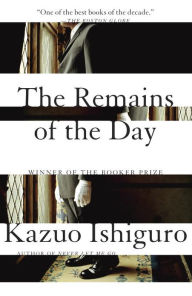
The Remains of the Day is number three in my journey through all of Kazuo Ishiguro’s novels. His first two were set in Japan, but in this one–which won the Booker Prize in 1989–we are in 1956 in England.
Stevens, the narrator, is butler at Darlington House, where for most of his career he served Lord Darlington. For the past few years the house has been owned by an American, Mr. Farraday.
During an absence by the owner, Farraday convinces Stevens to take a motoring holiday to see something other than Darlington House. Stevens agrees to the plan because it gives him a good excuse to visit a former colleague and unspoken love interest, Mrs. Benn nee Kenton. Stevens has had a letter from her recently which has given him hope that her marriage has ended and that she may be interested in returning to Darlington House as housekeeper. He expends a great deal of thought trying to read between the lines of the letter.
The narrative, then, is the week-long motoring trip Stevens takes to see Miss Kenton. Each day’s entry is a little about the journey itself, but most of the book is Stevens’s memories of the critical days at Darlington House in the 1930s when Lord Darlington was an active participant in the appeasement talks with the Germans in the lead-up to World War II.
So much of the story is about how our memories can be fragmentary and misunderstood. Stevens struggled to remember the chronology of some events, and he can’t determine whether it’s because he’s confusing different events from different times, or whether his blindness has colored his memories–blindness caused by his loyalty to Lord Darlington despite his misguided efforts, loyalty to his definition of “dignity,” loyalty to the feelings he has hidden toward Miss Kenton.
At times, it’s an interesting look into a bygone era where the grand houses maintained such formal and extensive serving staffs, but it’s also a painful and poignant story of loss and missed opportunities. This is the novel that launched Ishiguro into international prominence. And it’s just as rewarding on a rereading as it was the first time. And if you’re a fan of Downton Abbey–and who isn’t?–you’re likely to enjoy this one.
Stevens, the narrator, is butler at Darlington House, where for most of his career he served Lord Darlington. For the past few years the house has been owned by an American, Mr. Farraday.
During an absence by the owner, Farraday convinces Stevens to take a motoring holiday to see something other than Darlington House. Stevens agrees to the plan because it gives him a good excuse to visit a former colleague and unspoken love interest, Mrs. Benn nee Kenton. Stevens has had a letter from her recently which has given him hope that her marriage has ended and that she may be interested in returning to Darlington House as housekeeper. He expends a great deal of thought trying to read between the lines of the letter.
The narrative, then, is the week-long motoring trip Stevens takes to see Miss Kenton. Each day’s entry is a little about the journey itself, but most of the book is Stevens’s memories of the critical days at Darlington House in the 1930s when Lord Darlington was an active participant in the appeasement talks with the Germans in the lead-up to World War II.
So much of the story is about how our memories can be fragmentary and misunderstood. Stevens struggled to remember the chronology of some events, and he can’t determine whether it’s because he’s confusing different events from different times, or whether his blindness has colored his memories–blindness caused by his loyalty to Lord Darlington despite his misguided efforts, loyalty to his definition of “dignity,” loyalty to the feelings he has hidden toward Miss Kenton.
At times, it’s an interesting look into a bygone era where the grand houses maintained such formal and extensive serving staffs, but it’s also a painful and poignant story of loss and missed opportunities. This is the novel that launched Ishiguro into international prominence. And it’s just as rewarding on a rereading as it was the first time. And if you’re a fan of Downton Abbey–and who isn’t?–you’re likely to enjoy this one.
 RSS Feed
RSS Feed
